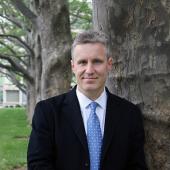
Martin Z. Bazant, E. G. Roos (1944) Professor of Chemical Engineering and Mathematics and Executive Officer, Department of Chemical Engineering, Massachusetts Institute of Technology, recipient of the 2018 Andreas Acrivos Award for Professional Progress in Chemical Engineering, will deliver a featured lecture on November 12, 2019.
Andreas Acrivos Award for Professional Progress in Chemical Engineering:
In honor of one of the chemical engineering profession’s most influential leaders and one of the great fluid dynamacists of the 20th century, the American Institute of Chemical Engineers (AIChE) has renamed the Professional Progress Award the Andreas Acrivos Award for Professional Progress in Chemical Engineering.
This award is endowed by the AIChE Foundation thanks to the generous support of the Andreas Acrivos Award for Professional Progress in Chemical Engineering.
See Founding Donors

Refreshments will be served.
Recognizes outstanding progress in the field of chemical engineering. The awardee will have made a significant contribution to the science of chemical engineering through one of the following means:
- A theoretical discovery or development of a new principle in the chemical engineering field.
- Development of a new process or product in the chemical engineering field.
- An invention or development of new equipment in the chemical engineering field.
- Distinguished service rendered to the field or profession of chemical engineering.
Control of Interfacial Stability in Electrochemical Systems
The shape and composition of electrochemical interfaces often undergo instabilities, which are notoriously difficult to understand and control in engineering applications. The first part of this talk will describe three examples of interfacial patterns – viscous fingers, deionization shocks, and metal dendrites – whose stability can be controlled by electrokinetic phenomena in charged porous media, as evidenced by both theory and experiments. Potential applications include electrically enhanced oil recovery, water desalination and purification by shock electrodialysis, and energy storage with rechargeable metal batteries. The second part of the talk will describe how driven electrochemical reactions can alter the thermodynamic stability of solid or liquid interfaces, with applications to Li-ion batteries, electrodeposition, corrosion, and biological pattern formation.

